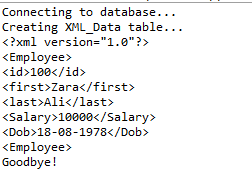JDBC的流数据
以下内容引用自http://wiki.jikexueyuan.com/project/jdbc/streaming-data.html:
PreparedStatement对象必须具备使用输入和输出流来提供参数数据的能力。这能够将整个文件存储到数据库列中,这样数据库就能存储大型数据,例如CLOB和BLOB数据类型。
用于流数据有下列几种方法:
- setAsciiStream():该方法是用来提供较大的ASCII值。
- setCharacterStream():该方法是用来提供较大的UNICODE值。
- setBinaryStream():该方法是用来提供较大的二进制值。
setXXXStream()方法需要一个额外的参数,该参数是除了参数占位符的文件大小。这个参数通知驱动程序通过使用流有多少数据被发送到数据库中。
示例:
假要上传一个名为XML_Data.xml的XML文件到数据库的表中。下面是该XML文件的内容:
<?xml version="1.0"?> <Employee> <id>100</id> <first>Zara</first> <last>Ali</last> <Salary>10000</Salary> <Dob>18-08-1978</Dob> <Employee>
将该XML文件和要运行的示例保存在相同的目录的。
这个示例将创建一个数据库表XML_Data,然后XML_Data.xml将被上传到该表中。
将下面的示例拷贝并粘帖到JDBCExample.java中,编译并运行它,如下所示:
//Import required packages import java.sql.*; import java.io.*; import java.util.*; public class JDBCExample { // JDBC driver name and database URL static final String JDBC_DRIVER = "com.mysql.jdbc.Driver"; static final String DB_URL = "jdbc:mysql://localhost/Test?serverTimezone=UTC"; // Database credentials static final String USER = "root"; static final String PASS = "root"; public static void main(String[] args) { Connection conn = null; PreparedStatement pstmt = null; Statement stmt = null; ResultSet rs = null; try { // Register JDBC driver Class.forName("com.mysql.jdbc.Driver"); // Open a connection System.out.println("Connecting to database..."); conn = DriverManager.getConnection(DB_URL, USER, PASS); // Create a Statement object and build table stmt = conn.createStatement(); createXMLTable(stmt); // Open a FileInputStream File f = new File("XML_Data.xml"); long fileLength = f.length(); FileInputStream fis = new FileInputStream(f); // Create PreparedStatement and stream data String SQL = "INSERT INTO XML_Data VALUES (?,?)"; pstmt = conn.prepareStatement(SQL); pstmt.setInt(1, 100); pstmt.setAsciiStream(2, fis, (int) fileLength); pstmt.execute(); // Close input stream fis.close(); // Do a query to get the row SQL = "SELECT Data FROM XML_Data WHERE id=100"; rs = stmt.executeQuery(SQL); // Get the first row if (rs.next()) { // Retrieve data from input stream InputStream xmlInputStream = rs.getAsciiStream(1); int c; ByteArrayOutputStream bos = new ByteArrayOutputStream(); while ((c = xmlInputStream.read()) != -1) bos.write(c); // Print results System.out.println(bos.toString()); } // Clean-up environment rs.close(); stmt.close(); pstmt.close(); conn.close(); } catch (SQLException se) { // Handle errors for JDBC se.printStackTrace(); } catch (Exception e) { // Handle errors for Class.forName e.printStackTrace(); } finally { // finally block used to close resources try { if (stmt != null) stmt.close(); } catch (SQLException se2) { } // nothing we can do try { if (pstmt != null) pstmt.close(); } catch (SQLException se2) { } // nothing we can do try { if (conn != null) conn.close(); } catch (SQLException se) { se.printStackTrace(); } // end finally try } // end try System.out.println("Goodbye!"); }// end main public static void createXMLTable(Statement stmt) throws SQLException { System.out.println("Creating XML_Data table..."); // Create SQL Statement String streamingDataSql = "CREATE TABLE XML_Data " + "(id INTEGER, Data LONG)"; // Drop table first if it exists. try { stmt.executeUpdate("DROP TABLE XML_Data"); } catch (SQLException se) { } // do nothing // Build table. stmt.executeUpdate(streamingDataSql); }// end createXMLTable }// end JDBCExample
当运行JDBCExample时,它将展示下面的结果:
测试工程:https://github.com/easonjim/5_java_example/tree/master/jdbcbasics/test9




【推荐】国内首个AI IDE,深度理解中文开发场景,立即下载体验Trae
【推荐】编程新体验,更懂你的AI,立即体验豆包MarsCode编程助手
【推荐】抖音旗下AI助手豆包,你的智能百科全书,全免费不限次数
【推荐】轻量又高性能的 SSH 工具 IShell:AI 加持,快人一步